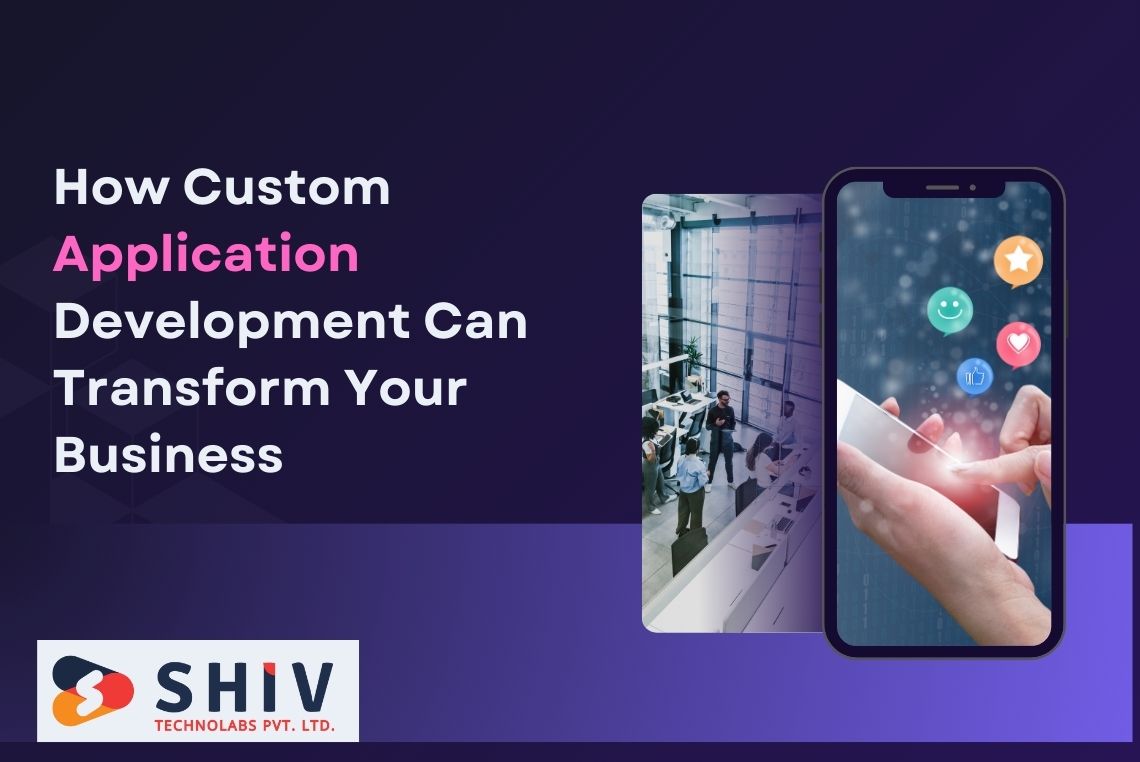Table of Contents
In the current technology-driven business environment, companies must have advanced solutions to stay competitive in the market. Traditional software often falls to address some specific organizational needs, which can impact efficiency and growth of the business. While, Custom application development provides a custom approach to create software solutions which aligns with the unique requirements of Business.
The demand for custom software solutions has been increasing with the businesses which seeks an applications that meets with their specific operational needs. According to a recent report by Statista, the global custom software development market is expected to reach over $650 billion by 2026, growing at a compound annual growth rate (CAGR) of approximately 5.7%. This surge in demand tells that the value of custom solutions increase over generic software. Custom mobile app development is particularly relevant, with businesses recognizing the need for applications designed specifically to enhance their unique processes and engage users more effectively.
Moreover, a survey by Clutch revealed that 56% of businesses prefer custom mobile app development services to ensure their applications meet precise requirements and achieve strategic goals. This preference is driven by the growing need for apps that integrate well with existing systems and offer a high degree of functionality tailored to business-specific challenges. As technology continues to advance, the role of mobile app development services in providing solutions that meet individual business needs will become increasingly critical in maintaining a competitive edge.
What Are Custom Apps?

Custom applications are software solutions specifically designed to meet the unique needs of a business. Unlike off-the-shelf software, which is designed for a broad audience with general features, custom apps are built from scratch to cater to particular business processes and goals.
# Key Features of Custom Apps:
- Purpose-Driven Functionality: Custom apps are developed with the specific needs of a business in mind. This includes features and functions that are directly relevant to the organization’s operations, ensuring that the software supports and enhances daily activities.
- Adaptability: As businesses evolve, so do their needs. Custom applications offer the flexibility to be modified and expanded to meet new requirements or accommodate growth, providing a long-term solution that can adapt to changing conditions.
- Integration Capabilities: Custom apps can be designed to work seamlessly with existing systems and tools used within the organization. This facilitates efficient data management and promotes a cohesive technology environment.
- Strategic Advantage: By developing software that aligns precisely with business processes, companies can achieve a competitive edge. Custom applications offer unique features and functionalities that set them apart from generic solutions, leading to improved operational efficiency and effectiveness.
What Is Custom Application Development?
Custom application development is the process of creating software tailored specifically to the needs of an organization. This process involves several critical stages to ensure the final product meets the business’s requirements and objectives.
# Stages in Custom Application Development:
- Requirements Gathering: This initial phase of Custom Application Development involves identifying the needs of the business through detailed discussions with stakeholders. The goal is to understand what the software should accomplish and how it should fit into existing workflows.
- Design and Prototyping: During this stage, the development team creates a blueprint for the application. This includes designing the user interface and functionality, and also developing prototypes to visualize the structure and features of the application. Prototyping helps in making necessary adjustments early in the development process.
- Development: The core development phase involves coding and building the application according to the approved design. Developers work on implementing features, integrating systems, and ensuring that the application functions as intended.
- Testing: Before deployment, the application undergoes rigorous testing to identify and resolve any issues. This includes checking for functionality, performance, and user acceptance to ensure the application meets the necessary standards and requirements.
- Implementation: Once testing is complete, the application is prepared for launch. This stage includes setting up the application in the production environment, configuring necessary systems, and training users to effectively operate the new software.
- Maintenance and Support: After the application goes live, ongoing maintenance and support are crucial to address any emerging issues, perform updates, and make improvements based on user feedback. This helps to ensure the application remains functional and relevant over time.
Also read : How to Optimize Mobile Apps for Better Performance
Benefits of Custom Application Development:
Custom application development offers significant advantages over traditional off-the-shelf software solutions. While ready-made software may be a quick fix, custom-built applications are designed to align precisely with a business’s specific needs and objectives, delivering greater value and effectiveness.
# Specific Solutions:
Custom apps are designed to fit the exact needs of a business. This means that every feature and function is aligned with the organization’s goals, providing a solution that is tailored to its specific requirements.
# Improved Efficiency:
By automating repetitive tasks and integrating with existing systems, custom applications can significantly enhance operational efficiency. This reduces manual effort, minimizes errors, and allows employees to focus on more strategic activities.
# Competitive Edge:
Custom software solutions offer unique capabilities not available in standard products. This differentiation can give businesses a competitive advantage by enabling more effective operations and better customer service.
# Enhanced Security:
Custom applications can be designed with advanced security features to protect sensitive data. This includes implementing specific security measures tailored to the business’s needs, reducing the risk of breaches and unauthorized access.
# Growth Flexibility:
As businesses grow and their needs change, custom applications can be adjusted to accommodate new requirements. This flexibility ensures that the software continues to support the organization’s evolving needs, providing long-term value.
Drawbacks in Traditional App Development

Traditional application development methods, particularly those involving off-the-shelf solutions, can pose several challenges and limitations for businesses. While these approaches may seem convenient, they often fall short of addressing the specific needs and goals of an organization.
# Generic Solutions:
Off-the-shelf software is designed to serve a wide range of users and industries. As a result, these applications offer a broad set of features that may not align perfectly with your business processes. Businesses may find themselves having to adapt their operations to fit the software rather than having the software fit their operations.
# Limited Customization:
Most pre-built applications offer limited options for customization. Users are constrained by the features and functionalities provided, and making significant changes often requires extensive modifications or may not be possible at all. This lack of flexibility can result in inefficiencies and an inability to fully meet the organization’s needs.
# Integration Challenges:
Integrating off-the-shelf software with existing systems and tools can be complex and problematic. Compatibility issues may arise, leading to data silos and disrupted workflows. In many cases, businesses need to invest in additional tools or custom solutions to bridge these gaps, adding to the overall cost and complexity.
# Scalability Issues:
As a business grows, its software needs may evolve. Off-the-shelf applications might not be designed to accommodate these changes, leading to difficulties in scaling the solution to match the organization’s growth. Customization options are often limited, and businesses may face challenges when trying to expand or adapt the software.
# Security Concerns:
Pre-built software often comes with standard security features that may not be sufficient for every organization’s needs. These applications may have vulnerabilities that could expose sensitive data to risks. Custom security measures are often necessary to address specific threats and ensure data protection, which can be challenging with generic solutions.
# Vendor Dependency:
Relying on third-party software means depending on the vendor for updates, support, and fixes. Any delays or issues on the vendor’s side can impact your operations. Additionally, businesses might face difficulties if the vendor discontinues the product or stops supporting it, leading to potential disruptions.
Also read : Top 10 Android App Development Frameworks: Best Options in 2024
Future Trends in Custom Application Development
The field of custom application development is continually evolving, driven by advancements in technology and changing business needs. Here are some key trends shaping the future of custom software development:
# Integration of Artificial Intelligence:
Artificial Intelligence (AI) and machine learning are becoming increasingly integral to custom applications. AI can enhance functionality by providing predictive analytics, automating routine tasks, and offering personalized user experiences. The use of AI in custom applications helps businesses make data-driven decisions and improve operational efficiency.
# Increased Focus on User Experience (UX):
User experience remains a critical factor in custom application development. Developers are placing more emphasis on creating intuitive, user-friendly interfaces that enhance usability and engagement. Custom applications are being designed with a focus on providing a smooth and enjoyable experience for users, ensuring they can navigate and utilize the software effectively.
# Adoption of Cloud-Based Solutions:
Cloud computing continues to influence custom application development. Cloud-based solutions offer flexibility, scalability, and cost-effectiveness, allowing businesses to access their applications from anywhere and scale resources as needed. Custom applications that leverage cloud technologies can provide better performance and accommodate growing business needs.
# Growth of Mobile and Cross-Platform Development:
With the growing reliance on mobile devices, there is an increasing demand for applications that are both mobile-friendly and capable of operating across different platforms. This trend has led to a rise in the development of cross-platform applications, which can function smoothly on various systems, including iOS and Android. By focusing on custom development, businesses can ensure their apps are compatible with both iOS app development and Android app development, providing users with a consistent experience regardless of their device.
# Emphasis on Security and Compliance:
As cyber threats become more sophisticated, there is a heightened focus on security in custom application development. Developers are implementing advanced security measures, including encryption, multi-factor authentication, and secure coding practices, to protect data and comply with regulatory requirements. Custom applications are being designed with robust security protocols to safeguard sensitive information.
# Integration of Internet of Things (IoT):
The Internet of Things (IoT) is increasingly being incorporated into custom applications. IoT integration allows businesses to connect and manage various devices and sensors, enabling real-time data collection and analysis. This trend is driving innovations in industries such as manufacturing, healthcare, and logistics, where IoT can improve operational efficiency and provide valuable insights.
Conclusion
Custom application development stands out as a powerful solution for businesses seeking software that aligns with their unique needs and workflows. By opting for custom-built applications, organizations can address specific challenges, improve efficiency, and gain a competitive edge in the market. While traditional off-the-shelf solutions may offer convenience, they often fall short in terms of flexibility, integration, and scalability. This is particularly relevant in the context of mobile app development in USA, where businesses require solutions that cater to diverse needs and changing market conditions.
Future trends in custom application development, such as the integration of AI, cloud computing, and enhanced security measures, promise to further revolutionize the way businesses operate. Companies that embrace these innovations will be well-positioned to adapt to evolving demands and drive sustained growth.
At Shiv Technolabs, our team of expert mobile application developers is dedicated to create custom solutions to your business’s needs. Whether you are looking to build a new application from scratch or to enhance an existing one, our comprehensive approach ensures that you receive a high-quality product that supports your strategic goals. Partner with us to transform your business with software that truly fits.



















